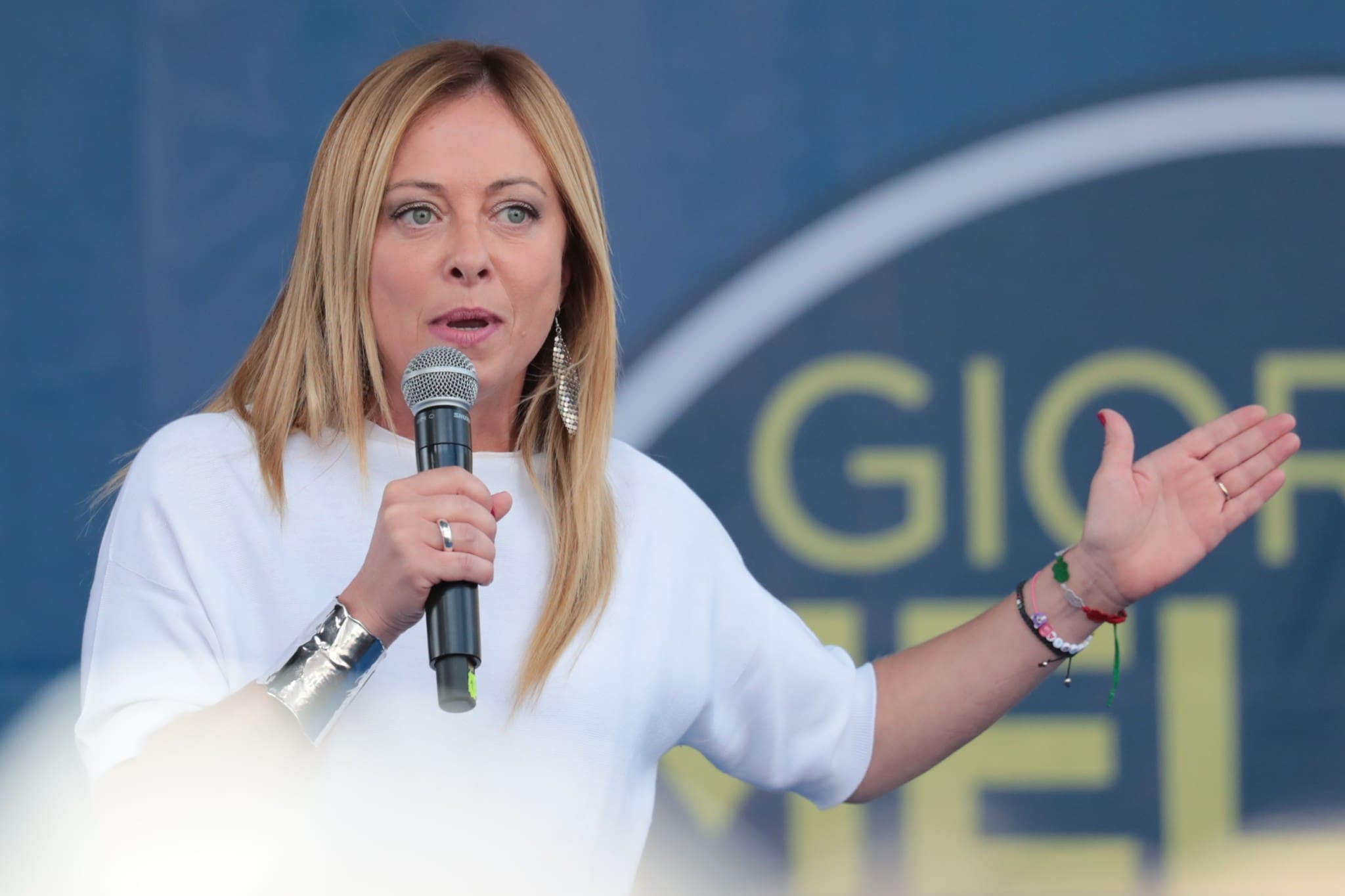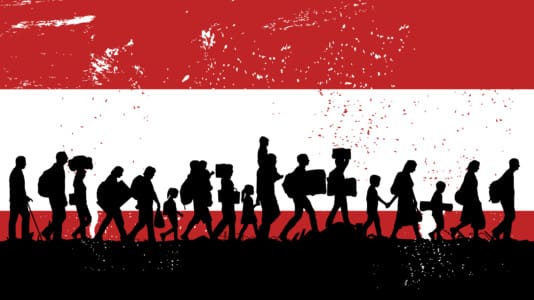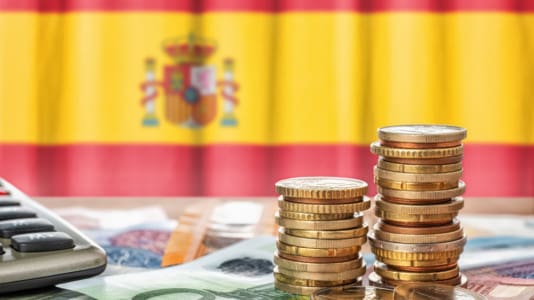On Sunday, Italians will choose the new members of both the Chamber of Deputies and the Senate. Being credited with almost 50 percent of the vote by the last opinion polls that could legally be published up to 15 days before the election, the right-wing bloc looks set to have an absolute majority in both houses of parliament and possibly even — thanks to an electoral reform pushed through by the left — a constitutional majority.
Such a result would amount to a political earthquake in the European Union.
The prospect of Giorgia Meloni, the leader of the right-wing, liberal-conservative Fratelli d’Italia party, becoming Italy’s next prime minister is raising alarm in the most left-leaning European capitals and across Western Europe’s mostly left-wing mainstream media. And with Italy now having a Hungarian-like mixed electoral system — with 37 percent of MPs elected by a majority vote in constituencies and the remaining MPs being elected by a proportional vote on party lists — the right-wing coalition could even enjoy a two-third constitutional majority just as Viktor Orbán has for most of the last 12 years, much to the distress of the left-liberal establishment in Brussels.
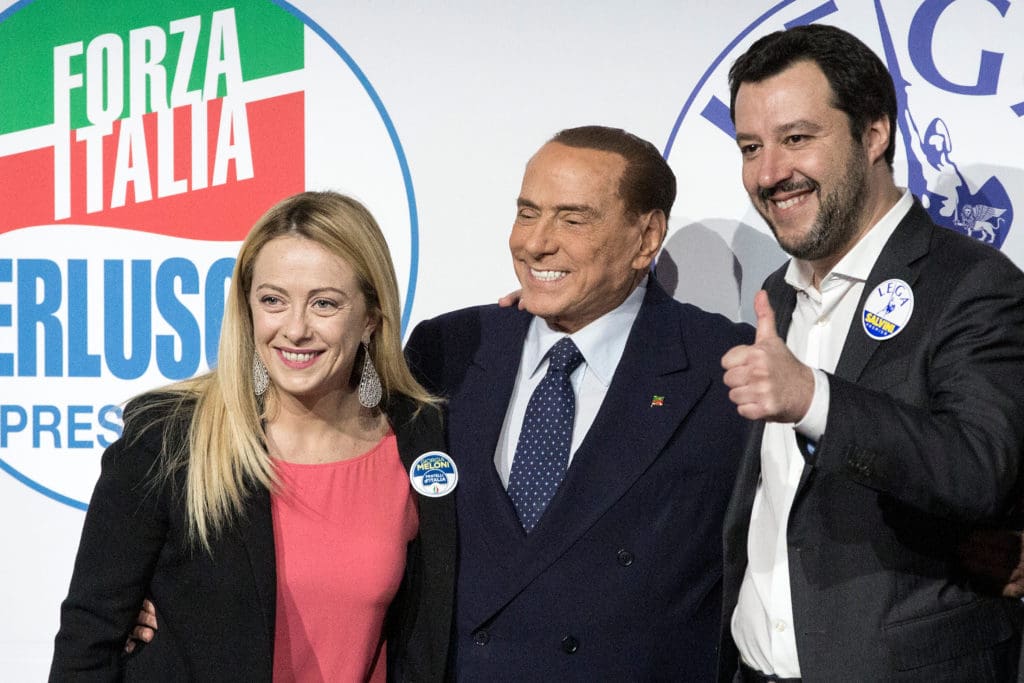
Indeed, within the “center-right,” which is the name by which the alliance of center-right and right-wing conservative parties go in Italy, Meloni’s Fratelli d’Italia (Brothers of Italy) have been leading in polls for many months, at 20-25 percent of voting intentions, leaving Matteo Salvini’s Lega (the League) far behind with only 12-15 percent (versus 34 percent of the vote in the 2019 elections to the European Parliament) and some 7-10 percent for Silvio Berlusconi’s center-right Forza Italia (Forward Italy).
Once seen as being Italy’s most likely next prime minister, Salvini is thus paying a heavy price for having taken part in Mario Draghi’s grand coalition government dominated by the left, although it is not Salvini but the split within the left — between Enrico Letta’s Democratic Party (PD) and Giuseppe Conte’s 5-Star Movement (M5S) — that led to Draghi’s resignation and the call for early elections.
The European left’s panic is best illustrated with this week’s cover published by the German weekly Stern, with Giorgia Meloni being depicted as “Europe’s most dangerous woman.”
“Post-fascist Giorgia Meloni can win the elections with the help of Putin’s friends. This would have extreme consequences for us,” the Stern cover reads.
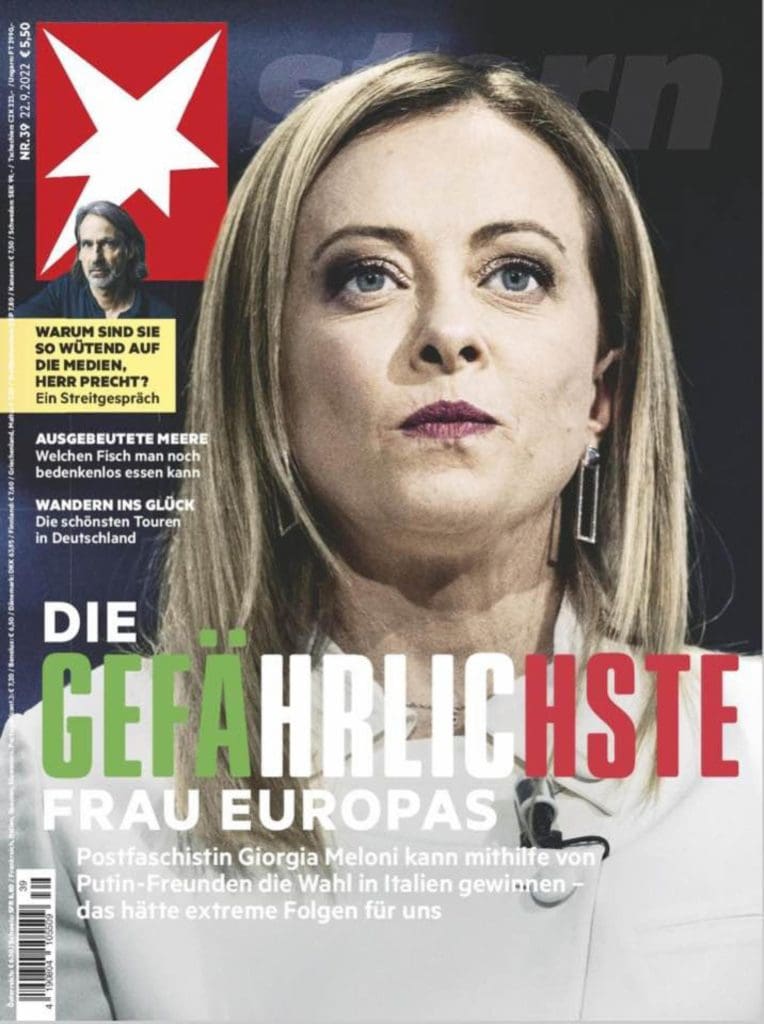
“Italy is facing a landmark election, with no less than three parties of the center-right bloc wanting less European cooperation,” according to the Stern.
“Currently, that camp is leading in the polls. Should it win, things would change, and not just for Italy. (…) First and foremost among those worrying many is Meloni of the extreme right-wing Fratelli d’Italia (“Brothers of Italy”), who leads significantly in polls and has the best chance of becoming prime minister. The woman from Rome does not think much of the EU, regularly rails against the “bureaucrats from Brussels,” and models her ideas on countries like Hungary and Prime Minister Viktor Orbán, who is a friend of hers.”
Stern also refers to Meloni’s ally Salvini: “This week, the focus immediately turned to Salvini and the League when an intelligence report became public in the U.S. that revealed Russia paid parties abroad for years. Salvini promptly rebuffed, saying he ‘never asked for or received any funds, no rubles, euros, dinars or dollars.'”
However, the truth is that Salvini and his League party were not named in that report, although Italy’s left has been trying very hard to make Italians think both the League and Forza Italia are mentioned there, including Letta’s center-left PD, which is made up of, among others, former members of the Italian Communist Party who did, in the time of Soviet Russia, take money from Moscow.
[pp id=46537]
The Communist roots of Italy’s center-left were best exposed during an electoral rally in which the center-left governor of the Puglia region, Michele Emiliano, speaking in the presence of the PD leader Enrico Letta, promised that his region would be Italy’s Stalingrad, and that the right-wing alliance “will not pass here, whatever happens.” Emiliano even added about the right, in a context of increasing verbal and physical violence against right-wing candidates and activists all over Italy, that “they will split blood, however this election goes.”
In the meantime, on Sept. 19, public broadcaster RAI aired an interview with French media-friendly, left-wing philosopher Bernard-Henri Lévy, a staunch supporter of French President Emmanuel Macron. In that interview, ‘BHL,’ as the French call him, went unopposed when he expressed the view that the results of an election should not always be respected and when he compared the Italian right’s predicted victory under the leadership of Giorgia Meloni to the pre-World War II electoral wins of the fascists in Italy and the Nazis in Germany.
Meloni herself reacted on Twitter by saying: “The public service hosts a French writer — who defended communist terrorist Cesare Battisti in the past — to explain the left’s idea of democracy and compare a center-right-led Italy to the worst regimes. That is: if Italians vote FdI or Lega, they are not to be respected.”
It was only after an uproar among right-wing politicians and the broader public, as well as within the Rai’s journalists’ trade union Usigrai, that the journalist who hosted BHL, former editor-in-chief of L’Espresso, Marco Damilano, distanced himself from what his guest had said.
The Italian media authority (Agcom) was called upon and, after having reviewed Damilano’s daily show on public television RAI 3 for the past week of the electoral campaign, it came to the conclusion that “there had been a violation of the principles of fairness and impartiality” during the whole week, and that on Sept. 19 in particular, “the principles of pluralism, objectivity, completeness, fairness, loyalty, and impartiality of information were not respected.”
Berlusconi’s center-right Forza Italia had been among those who turned to Agcom through Senator Maurizio Gasparri, a member of the parliamentary oversight committee who accused the left of considering RAI “one of its dependencies.”
[pp id=48588]
The Italian right wing’s “social and moral agenda is frightening,” said the European Commission’s first vice-president in charge of the Green Deal, Dutch socialist Frans Timmermans, in an interview for La Repubblica on Sept. 8. A member of the European Commission is not supposed to intervene in a member state’s national elections as they are expected to at least pretend to be politically neutral when dealing with member states.
However, it is not a first for Timmermans who had already expressed his open support for his leftist allies during election campaigns against Fidesz in Hungary and PiS in Poland, when he was the Juncker Commission’s vice-president in charge of the rule of law, leading to doubts about the impartiality of his earlier rule-of-law proceedings against the two Central European countries’ conservative governments.
Answering the remark that “Giorgia Meloni has been recently using different tones in confrontations with the EU, but retains friendship with Hungary’s Orbán,” Timmermans said: “Let’s be clear: I don’t know any sovereignists who are not against European institutions. So, it doesn’t matter what they say today. Poland’s Kaczynski, for example, is anti-Russia but also anti-Brussels and anti-European institutions. Sovereignists do not tolerate doing things together.”
“Would a right-wing victory in Italy challenge the values of the EU?” the left-wing daily La Repubblica asked the European Commission’s first vice-president, to which he answered:
“I still have enormous confidence in Italian democracy and its institutions. However, I am afraid of the social and moral agenda of the right. Just think of what they say about women. I see that the radical right wants to reopen the debate on the right to abortion. The same goes for homosexual unions. This moral and social agenda would set us back at least 30 years.”
[pp id=46790]
While on a trip to Germany where he got the support of Chancellor Olaf Scholz’s SPD, Enrico Letta, the leader of the main left-wing party went to great lengths to convince Italians that if the right-wing alliance does win the election on Sept. 25 and Giorgia Meloni becomes Italy’s prime minister, then the European Commission might suspend the payment of EU funds just as it has been doing with Poland and Hungary.
“If the right wins, Italy risks being the next Hungary. We must avoid that,” Letta warned, pointing to the fact that “the damage would be paid by Italians, of all political orientations, with a recession, interest on mortgages, debt, and cuts in services.”
Letta and his SPD friends, together with the European Commission’s first vice-president, have thus made clear once again that in recent years getting EU funds has become conditional not on abiding by the rule of law but rather by the leftist values of the likes of Enrico Letta and Frans Timmermans.


